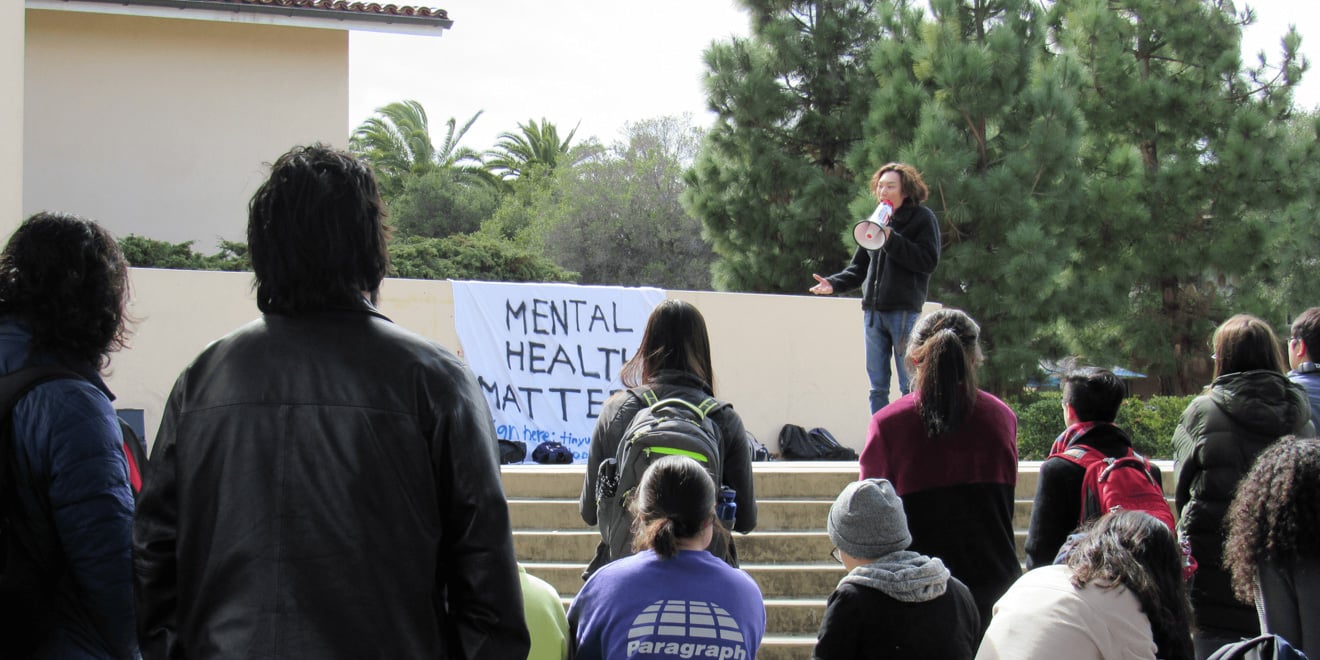Editor’s Note: This story contains references to suicide that may be troubling to some readers.
“A number of years ago, there was a wave of graduate student suicides. The University’s response was to create a program where students who live off campus could get boba or hamburgers together,” said graduate student Sandra Schachat to a crowd at White Plaza for a rally on Wednesday afternoon. “We don’t need more boba. We need humane policies that treat [students with mental health issues] with respect.”
The rally follows a petition circulated by the Stanford Asian American Activism Committee (SAAAC) on Feb. 11 demanding that the University change its “discriminatory” Dean’s Leave of Absence policy. By Wednesday morning, the petition had garnered more than 300 signatures from undergraduates, graduate students and alumni.
The petition was also accompanied by a statement, signed by 12 student organizations and addressed to University President Marc Tessier-Lavigne, Provost Persis Drell and Vice Provost for Student Affairs Susie Brubaker-Cole. The rally organizers delivered the full statement to Drell and Brubaker-Cole, who were both in attendance at the rally.
On May 17, 2018, the Disability Rights Advocates (DRA) legal center, acting on behalf of three Stanford students and the Stanford Mental Health & Wellness Coalition, filed a class action lawsuit against the University for “discriminatory” and “exclusionary” treatment of students suffering from mental health disabilities. Plaintiffs argue that Stanford has a “blanket practice” of pressuring students suffering from severe mental health issues into taking leaves of absence as opposed to providing them with reasonable accommodations that still allow them to enjoy access to Stanford’s programs and services.
Stanford’s current Dean’s Leave of Absence policy states that students may be asked or mandated to take a leave of absence should their psychiatric, psychological or medical condition “significantly disrupt” the activities of the University community or if their condition requires a level of care that exceeds what the University can “reasonably be expected” to provide for a student’s wellbeing.
Karen Bower, a lawyer focusing on disability discrimination cases in higher education, told the New York Times that a “disruption” could refer to students who use up too many University resources, inform peers of suicidal ideation or require repeated wellness checks.
Many of the rally’s attendees take issue with this exact language — the University’s view of students dealing with mental health issues as a disruption or as “liabilities” instead of as people.
“[On] the question of liability: it seems like that that is the University’s primary concern,” said Antonio Puglisi ’19, who was present at the rally. “[They think,] ‘Are we liable for this, and if we are, how can we get this [student] out of our hands right away?’”
Puglisi’s sentiment echoed an anonymous comment posted on a board set up in White Plaza by the SAAAC fall 2017: “Once they realize that you’re actually at risk, they’ll kick you out … so you don’t kill yourself here. At Stanford.”
The New York Times reported that some students have had positive experiences with leaves of absence, and the SAAAC wrote that they “understand the rationale behind creating a mechanism that allows students to leave campus for their own health and safety.”
But student petitioners and rally attendees believe mandatory leave should only be utilized as an “extreme, last-resort option” — otherwise, they argue, the policy not only distances students from their support systems on campus but imposes significant costs, such as an early housing termination fee, on their return.
However, Drell, Brubaker-Cole and the University did — at least outwardly — express openness to hearing students’ concerns. In an email to The Daily, Student Affairs spokesperson Pat Harris emphasized that the University welcomes engagement with students to “work together to improve our policies and processes.”
“It’s very moving,” Drell told The Daily after the end of the rally. “It takes a lot of courage on the part of the students to talk about the University in this way, and I admire [them].”
Yet, for some, a rhetorical assurance is not enough. In a statement to The Daily, Ethan Chua ’20, one of the main organizers of the petition and the rally, expressed concern that the University would respond with “another ‘we’re committed to changing campus culture’ kind of answer that doesn’t [actually] attend to actively harmful policies.”
Shortly following the lawsuit’s filing Brubaker-Cole released a “Notes from the Quad” post ensuring that the University would “continue to evaluate” the Dean’s Leave of Absence policy. While the University’s intention for a review of leave of absence policies was reiterated by Harris in an email to The Daily, it remains unclear if, when and to what extent changes will occur.
As of now, the University is engaged in settlement discussions with the DRA. An initial case management conference between the two parties is scheduled for Apr. 3 at 10:00 a.m.
Drell and Brubaker-Cole told The Daily that the “confidential” nature of the mediation did not allow them to comment on any developments and that they plan to release a statement or the timeline of the suit.
“Finding and receiving care should not be part of our mental health struggle,” said Kimiko Hirota ’20, who spoke at the rally. “But there is a justified fear of being involuntarily hospitalized or involuntarily removed from campus when seeking out critical help.”
Erin Woo contributed to this report.
Contact Elena Shao at eshao98 ‘at’ stanford.edu.
